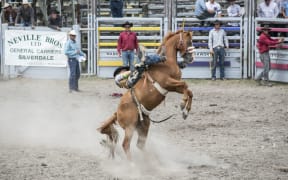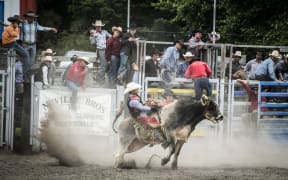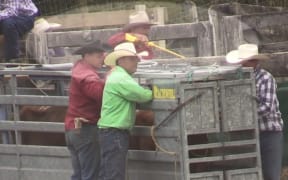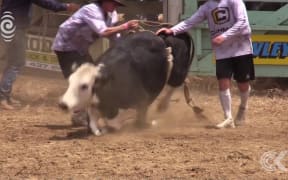Government officials have raised fresh concerns about rodeos, including suggesting the calf-roping event be banned.
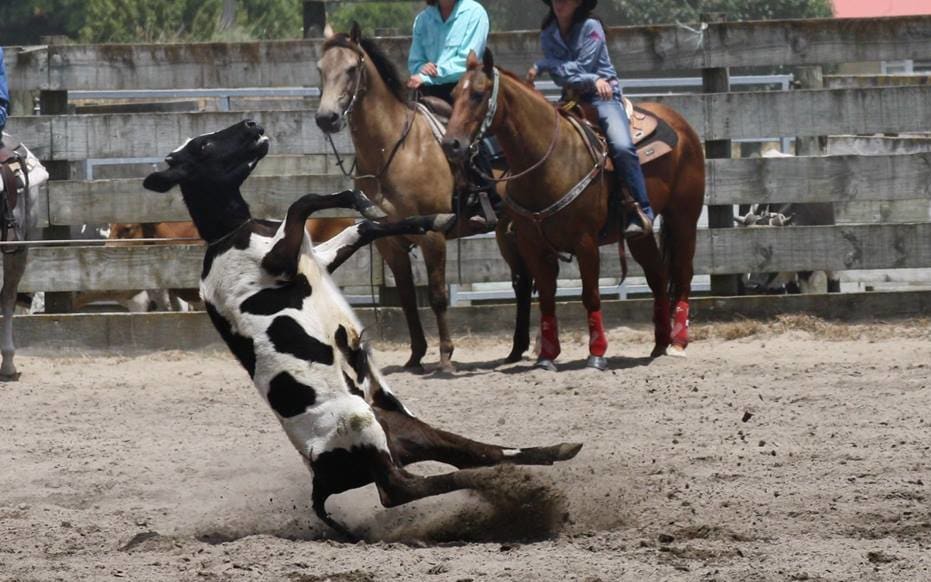
Calf-roping at the Huntly Rodeo in 2013: Documents show officials have raised concerns with this type of event. Photo: Anti-Rodeo Action
Documents released under the Official Information Act show the Ministry for Primary Industries' animal welfare inspectors have found breaches of the industry's code of welfare.
Hours of footage submitted by Anti Rodeo Action NZ of events in both the North and South Islands during the 2015/16 season were reviewed.
No one was prosecuted, but the ministry said there was room for improvement.
An inspector in the North Island found so-called busting - where a calf is thrown 180 degrees onto the broad of its back after being roped - was common in rodeos, despite being against the welfare code.
The code set national standards for rodeos and can lead to prosecutions.
A South Island inspector went further, saying rope-and-tie events were worrying - visually and emotionally - and should be banned.
Rope-and-tie was a timed event where a cowboy ropes, or lassos, a calf by tying its legs together.
The inspector said the image of a calf running in fear before being thrown to the ground "will always cause controversy".
"I believe this event is under the most threat of being banned," the inspector said. "I do not think there is any way to stop this image other than concluding the event nationally."
At one rodeo in Outram near Dunedin last year, the inspector found 13 breaches of the welfare code. They also found four breaches at a Methven rodeo and two at a Winchester radio, but dismissed other complaints.
Industry subject of 'a lot of untrue attacks'
The Rodeo Cowboys Association said it was waiting to review the ministry's comments.
However, spokesperson Gary Jackson said rodeos were a legal activity and the industry had nothing to hide.
He said the industry had been the subject of "a lot of untrue attacks" recently.
The National Animal Welfare Advisory Committee (NAWAC) provides independent advice to the Minister for Primary Industries and sets the code of welfare for rodeos.
Committee chair Gwyneth Verkerk said discussions about animal welfare with the Rodeo Cowboys Association were ongoing.
"NAWAC is aware of public concern and is considering the use of animals in sports events and entertainment," she said in a statement.
"A petition was put forward to a select committee last year to ban rodeos. The select committee decided the current rules were sufficient to deal with animal welfare issues at rodeos."
RNZ asked NAWAC if it was considering banning calf rope-and-tie events, considering the latest criticism, but its statement did not address the question.
SPCA chief scientific officer Arnja Dale said banning rope-and-tie events was necessary.
"We feel very strongly that New Zealand needs to join other countries such as Australia, the US, the UK, and even certain cities in New Zealand because calf-roping subjects young and naive animals to unnecessary pain and distress," she said.
"I don't think you could ever do the rope-and-tie events with young calves in a humane way."
An investigation by RNZ earlier this year found nearly 30 complaints have been made to the Ministry for Primary Industries about the mistreatment of animals in rodeos in the past five years - but no prosecutions have been taken.
After footage was revealed appearing to show calves being electric-shocked at one rodeo, some companies, including LJ Hooker, Harcourts, Ray White, PlaceMakers and Firth, all pulled their sponsorship.

